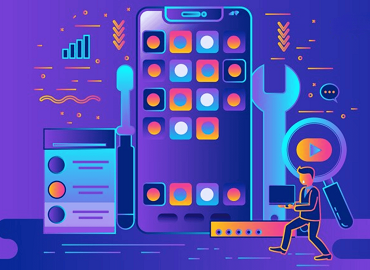How AI is Transforming Mobile App Development with Advanced Technologies
- Super User
ajay hooda
In today’s fast-paced digital world, businesses are no longer just looking for mobile apps—they want smart, AI-powered solutions that can predict user behaviour, personalize experiences, and automate workflows. AI mobile app development has emerged as a game-changer, integrating artificial intelligence with advanced mobile technologies to deliver apps that are not only functional but intuitive and adaptive.
From machine learning algorithms to edge computing and IoT integration, the tools and technologies behind AI mobile apps are enabling developers to craft solutions that transform business operations, improve engagement, and increase ROI.
Why AI is Critical in Modern Mobile Apps
AI brings intelligence to mobile apps, allowing them to understand, learn, and respond to user actions. Here are key reasons why businesses are turning to AI-driven mobile app development:
1.Personalization at Scale – AI enables apps to customize content, recommendations, and notifications based on individual user behavior. For example, a retail app can show products a user is most likely to buy using predictive analytics.
2.Enhanced User Engagement – Intelligent chatbots, voice assistants, and smart notifications improve user experience and retention.
3.Automation and Efficiency – AI can automate repetitive tasks, optimize backend processes, and reduce human error.
4.Predictive Insights – Apps can forecast trends, suggest actions, and support decision-making using AI analytics.
Key Technologies Powering AI Mobile Apps
Developing AI-driven apps involves a combination of software frameworks, platforms, and technologies. Here’s an overview of what developers typically use:
1. Machine Learning Frameworks
Machine learning (ML) is the backbone of AI apps. Developers leverage frameworks like TensorFlow, PyTorch, Core ML, and ML Kit to create models that can recognize patterns, make predictions, and automate decisions.
Applications include:
Image recognition for AR features
Recommendation engines for e-commerce apps
Fraud detection in fintech apps
2. Natural Language Processing (NLP)
NLP enables apps to understand and respond to human language. Popular use cases:
Chatbots for customer support
Voice-enabled assistants
Sentiment analysis in social or feedback apps
Developers integrate NLP frameworks such as Dialogflow, BERT, or GPT APIs to deliver intelligent conversational experiences.
3. Computer Vision and AR
AI-powered computer vision allows apps to interpret visual data from the camera, enabling features like:
Object detection for shopping apps
Facial recognition for security
Augmented reality experiences for gaming and education
4. Edge Computing & On-Device AI
Running AI models directly on devices enhances speed, privacy, and offline functionality. Edge AI is crucial for:
Real-time recommendations
Instant image or voice processing
IoT device interaction
5. Cloud Integration
Cloud platforms like AWS, Google Cloud, and Microsoft Azure host AI models and provide scalable infrastructure. Cloud AI services are used for:
Storing large datasets
Performing heavy computations
Real-time analytics across multiple devices
AI Mobile App Tech Stack Overview
When building AI-powered mobile apps, choosing the right mobile app development technologies and designing an efficient mobile app development tech stack is crucial for performance, scalability, and seamless user experience. A well-planned tech stack ensures that AI features like machine learning, natural language processing, and computer vision work smoothly across devices.
Here’s a breakdown of a typical mobile app development tech stack for AI-powered applications:
Using a robust mobile app development tech stack allows developers to integrate AI capabilities seamlessly, including predictive analytics, image and voice recognition, personalization, and real-time recommendations. Selecting the right mobile app development technologies not only improves app performance but also ensures that AI features are scalable, secure, and user-friendly.
Use Cases of AI in Mobile Apps 1. Retail & E-commerce
AI-powered apps can personalize shopping experiences, optimize inventory, and predict buying behavior, improving sales and retention.
2. Healthcare & Fitness
AI apps monitor health metrics, provide personalized fitness plans, and predict potential health risks using wearable device data.
3. Finance & Banking
Mobile banking apps use AI to detect fraud, automate credit scoring, and provide customer support via chatbots.
4. Logistics & Transportation
AI apps optimize delivery routes, predict maintenance issues, and automate fleet management.
Benefits of AI Mobile App Development for Businesses
Increased Engagement – Personalized experiences lead to higher app usage.
Better Decision-Making – Predictive analytics help companies act on insights quickly.
Operational Efficiency – Automation reduces manual effort and operational costs.
Competitive Advantage – AI mobile apps differentiate your business in a crowded market.
Challenges & Best Practices
While AI enhances mobile apps, developers face some challenges:
Data Privacy & Security: Ensure user data is encrypted and comply with regulations like GDPR.
Performance & Battery Usage: AI computations can drain battery; optimize models for mobile.
Model Accuracy: Continuous learning and retraining are needed for better predictions.
Choosing the Right Platform: Cross-platform frameworks vs native development depend on app requirements.
Best Practices:
Leverage on-device AI for sensitive data
Use cloud AI for heavy computations
Keep UX simple and AI-assisted
Monitor app performance and analytics continuously
Conclusion
AI is no longer optional in mobile app development—it’s the cornerstone of building smart, adaptive, and high-performing apps. By leveraging AI, machine learning, computer vision, NLP, cloud, and edge computing, businesses can offer personalized, automated, and intelligent experiences to users.
Partnering with an experienced AI mobile app development company like Ahex Technologies ensures your app is built with the right tech stack, optimized for performance, and ready to drive business growth.

